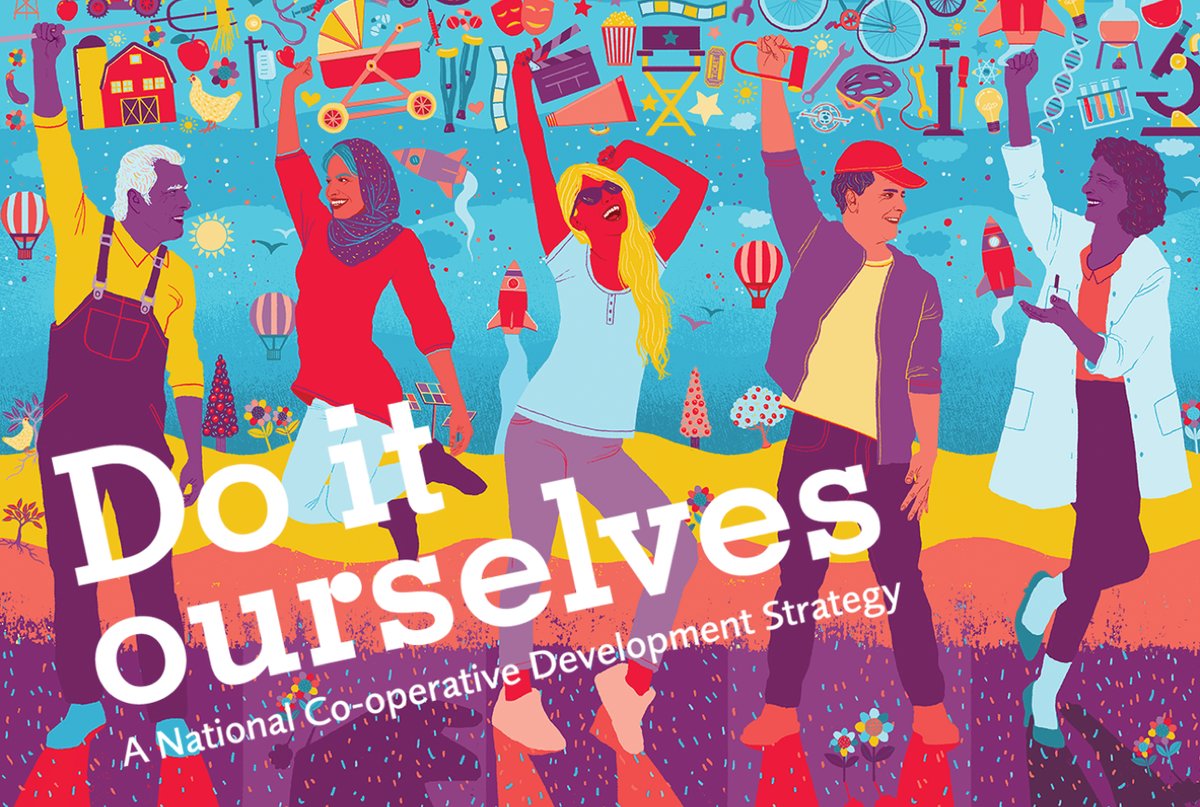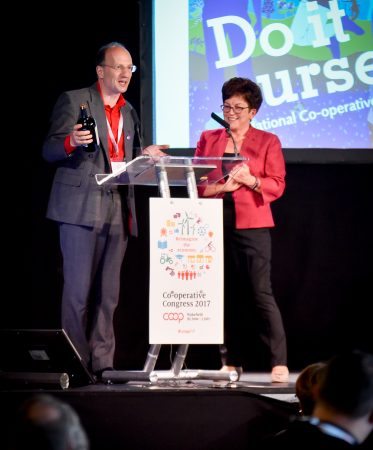A radical strategy to grow the UK co-op sector and reshape the country’s economy on more participative lines was announced at Co-operative Congress in Wakefield on 1 July – the International Day of Co-operatives.
Do It Ourselves, the National Co-operative Development Strategy led by Co-operatives UK, was launched by Dame Pauline Green, former president of the International Co-operative Alliance. The “fresh, simple and stimulating strategy” is a “call to action, based on our co-op roots, to actually do it ourselves,” she said.
By 2027, the strategy aims for a 50% increase in public perception of co-ops as modern and innovative; backing from major professional associations for the co-operative option; a tripling of the rate of co-op start-ups and conversions; and evidence in place of positive social and environmental impact.
By 2037, it wants half of the UK population to benefit from co-operative or mutual enterprises as a member; and for £1 in every £10 of the country’s GDP to be generated by participative businesses such as a co-op or mutual.
The strategy is focused on helping freelancers come together in the modern gig economy; meeting needs for social care through new models of co-operation; and encouraging new digital ventures, or ‘platform co-operatives’, using new technology for shared ownership services.
Co-operatives UK, the apex body for UK co-ops, has issued a pack to introduce the strategy, designed and printed by Calverts workers co-operative, with a booklet and 35 information cards developed with input and ideas from more than 550 co-ops.
It has also published a Technical Report which details the research, analysis and participatory planning that has fed into the core strategy.

The strategy asks co-operators to:
- Commit to be great at co-operation: This means living up to your own values, looking for ways to collaborate with others and choosing co-op, whether for your weekly shop or your service supplier.
- Be willing to be open to new co-operation: This means having new conversations and looking for new ways to act co-operatively.
- Join in campaigns for inspiring co-operation: This means having the confidence to spread the word about or campaign for co-operative action that gives you hope.
The strategy was drawn up after two years of dialogue with the movement, using studies of other countries with strong co-op sectors.
It encourages co-ops to live up to best practice governance, achieve values of equality and openness when it comes to age, gender and diversity; to trade with other co-ops and build the skills for co-operation.
And it wants co-ops to support innovation, be open with data, and look at new ways for workers and members to get involved.
Initiatives already in place include the Hive, a co-op support programme from the Co-op Bank; CoTech, a new network of technology co-ops which aims to grow 100,000 jobs in the sector by 2030; Unicorn Grocery‘s Replication Lab, to spread its co-op model; the Co-operative College’s Future Pioneers Fund to support co-op action; and Federation, an enterprise hub set up by the Co-op Group to create an open community of digital businesses in Manchester.

Dame Pauline told delegates at Congress that Co-operatives UK has already “encouraged co-ops around the country to step outside the silos they work in – agriculture. retail and so on and work together.
“When you’ve got professionalism of the retail movement meeting up with radicalism of worker co-ops, it’s very liberating,” she said. “A lot of new co-ops came out of that.”
And the new strategy will take this further, she added. “With the launch of this we’re on that same tipping point, where something big can happen.
“On the whole the people who were engaged in it hadn’t been involved in work of Co-operatives UK before. There were a lot of young people, it was very exciting and liberating.”
The ambitious strategy would try to harness that energy to reshape the country, with decent jobs and sustainability built into business, she told delegates.
“It’s not just about creating more co-ops, it’s about creating a more participative economy,” she said. “A more inclusive, more just economy for all.”
Describing the plight of freelancers in a precarious gig economy, and criticising Theresa May’s £1bn supply and confidence deal with the DUP during a time of austerity, she added: “The country and economy are in a quite perilous place right now. The government can find the magic money tree to pay a billion pounds to the DUP, but they can’t shake it to pay nurses more.
“People now want to be involved, they want to be valued for what they can offer. That’s what we saw in the community that came out after the horrible tragedy at the Grenfell Tower, in the families who campaigned after Hillsborough.”
And she said the strategy would help the co-op movement meet that need for change.
“One day most businesses will be run in a participative way,” she said. “It will be a different kind of economy, one in tune with our values.”
She urged co-operators to “Populate the strategy, make it your own,” to “show who you are” by using the Coop marque and .coop domain, and to work together to lobby government.
“Use your members, and look outwards,” she said. “We’re very good at looking inward in co-operatives, less good at looking outwards.
“This is an invitation for you to populate this strategy. This was designed to inspire people.”
- Find out more about the National Co-operative Development Strategy and download the resources at www.uk.coop/doit